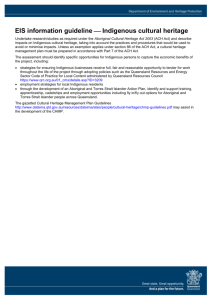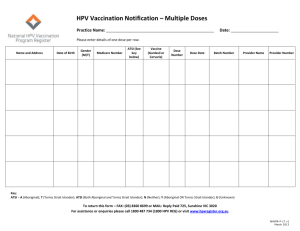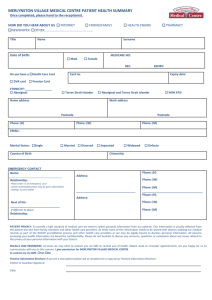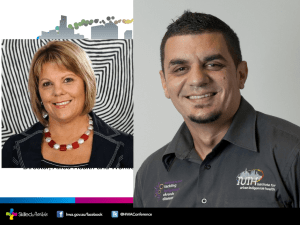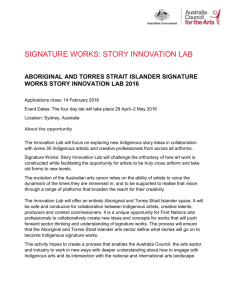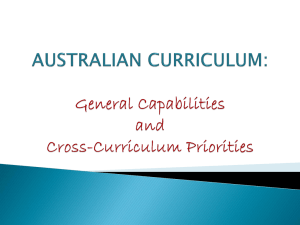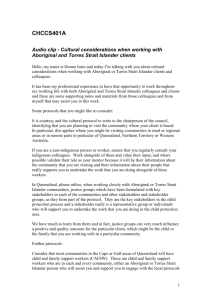Ideas for public libraries (PDF 230.9 KB)
advertisement
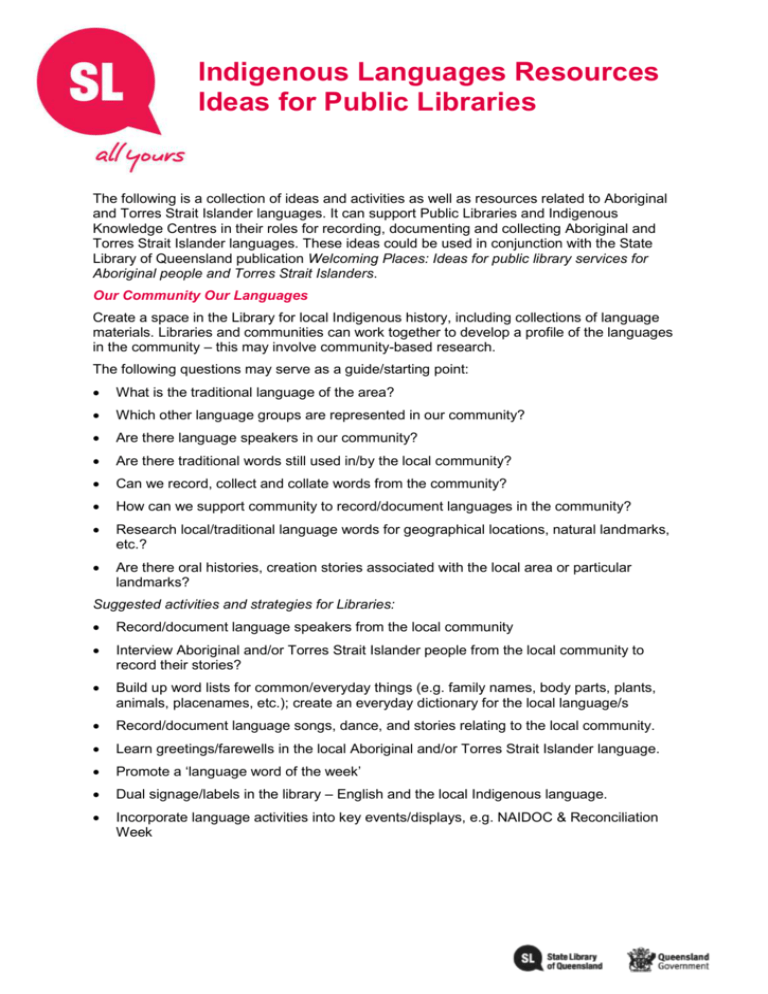
Indigenous Languages Resources Ideas for Public Libraries The following is a collection of ideas and activities as well as resources related to Aboriginal and Torres Strait Islander languages. It can support Public Libraries and Indigenous Knowledge Centres in their roles for recording, documenting and collecting Aboriginal and Torres Strait Islander languages. These ideas could be used in conjunction with the State Library of Queensland publication Welcoming Places: Ideas for public library services for Aboriginal people and Torres Strait Islanders. Our Community Our Languages Create a space in the Library for local Indigenous history, including collections of language materials. Libraries and communities can work together to develop a profile of the languages in the community – this may involve community-based research. The following questions may serve as a guide/starting point: What is the traditional language of the area? Which other language groups are represented in our community? Are there language speakers in our community? Are there traditional words still used in/by the local community? Can we record, collect and collate words from the community? How can we support community to record/document languages in the community? Research local/traditional language words for geographical locations, natural landmarks, etc.? Are there oral histories, creation stories associated with the local area or particular landmarks? Suggested activities and strategies for Libraries: Record/document language speakers from the local community Interview Aboriginal and/or Torres Strait Islander people from the local community to record their stories? Build up word lists for common/everyday things (e.g. family names, body parts, plants, animals, placenames, etc.); create an everyday dictionary for the local language/s Record/document language songs, dance, and stories relating to the local community. Learn greetings/farewells in the local Aboriginal and/or Torres Strait Islander language. Promote a ‘language word of the week’ Dual signage/labels in the library – English and the local Indigenous language. Incorporate language activities into key events/displays, e.g. NAIDOC & Reconciliation Week Websites/Weblinks The following is a selection of websites and weblinks that can support communities as well as libraries in the revival/revitalisation of Indigenous languages. Aboriginal Languages of Australia Virtual Library: One of the first websites devoted to Aboriginal and Torres Strait Islander languages – it has annotated links to 231 resources for about 80 languages www.dnathan.com/VL/austLang.htm Australian Indigenous Languages (Australian National University): Website developed by David Nash, Linguist, based at ANU – weblinks to resources, wordlists, research papers, etc. relating to Indigenous languages. www.anu.edu.au/linguistics/nash/aust/ Australian Institute of Aboriginal and Torres Strait Islander Studies (AIATSIS): AIATSIS is the premier institution in Australia and research about the cultures and lifestyles of Aboriginal and Torres Strait Islander peoples, past and present. They have an extensive collection of Aboriginal and Torres Strait Islander language resources: print, audio-visual and digitised materials. www.aiatsis.gov.au Other sections/units in AIATSIS: AIATSIS – Online exhibition ‘Collectors of Words’: Indigenous language wordlists collected by Robert Brough Smyth and Edward Micklethwaite Curr from the late 1800’s. www1.aiatsis.gov.au/exhibitions/languages/lang_hm.html AIATSIS Indigenous Language Select Bibliographies: The Australian Institute of Aboriginal and Torres Strait Islander Studies (AIATSIS) in Canberra has produced PDF versions of Select Bibliographies that provide a list of materials held by AIATSIS relating to specific languages/language groups across Australia. www.aiatsis.gov.au/library/languagebibs.html AIATSIS – Family History Unit: AIATSIS has an extensive collection of materials that relate to family history and genealogical research – www.aiatsis.gov.au/fhu/start.html Aboriginal Biographical Index (ABI) is a personal name index to published material held in the AIATSIS Library. www.aiatsis.gov.au/fhu/abi.html Federation of Aboriginal and Torres Strait Islander Languages and Culture (FATSILC): FATSIL is the national peak body for community based indigenous language programs in Australia. The organisation was established in 1991 in response to the Australian Language and Literacy Policy, to promote the maintenance, retrieval and revival of indigenous languages, through the support of community based language programs. www.fatsilc.org.au South Australian Museum: Norman B. Tindale: Tindale was an anthropologist whose research resulted in the ‘Tindale Map’ which depicts the distribution of Aboriginal languages; Tindale also mapped out genealogical and sociological profiles for Aboriginal communities in Eastern Australia. www.samuseum.sa.gov.au/tindale/index.html State Library of Queensland – Indigenous Languages in Queensland: Overview of the State Library of Queensland Indigenous Languages Program to support the revival and maintenance of Aboriginal and Torres Strait Islander languages in Queensland. www.slq.qld.gov.au/info/ind/languages SIL International: SIL International is a faith-based non-profit organization committed to serving language communities worldwide as they build capacity for sustainable language development. www.sil.org/ Queensland Indigenous Language Centres There are several Indigenous Language Centres in Queensland that support the revival and maintenance of Aboriginal and Torres Strait Islander languages. Activities may include language research, exhibitions and community training as well as the recording and/or documentation of Indigenous languages in Queensland. Other groups such as Aboriginal Land Councils, Cultural Organisations, Elders’ Groups, etc. may also be undertaking activities involving languages. Public Libraries are encouraged to explore partnerships and linkages to these local Aboriginal and Torres Strait Islander organisations, including community-based groups. In addition to supporting community language revival, these partnerships will also have a positive impact on Aboriginal and Torres Strait Islander involvement in Public Libraries. Central Queensland Language Centre (Bundaberg): This centre supports language activities in Central Queensland from Rockhampton to Maryborough and west to Longreach and the NT border. Address: Central Queensland Language Centre, Gidjarjil Aboriginal Development Corporation Ltd, 36 Quay Street [PO Box 2773], Bundaberg. Q. 4670. Phone: (07) 4153 6700 Email: cqlanguage.centre@gidarjil.com.au Korrawinga Aboriginal Corporation (Hervey Bay): This organisation supports Aboriginal language and cultural revival in the Hervey Bay/Wide Bay area. Address: 352 The Esplanade Scarness 4655. Phone: (07) 4124 4814 Email: korra@bigpond.net.au Nalingu Aboriginal Corporation (Mitchell): Located at Mitchell, in South-West Queensland, Nalingu supports language and cultural revival in the Mitchell community/region. Address: 32 Cambridge Street Mitchell Queensland 4465. Phone: (07) 4623 1423 Email: nalingu5@bigpond.com North Queensland Regional Aboriginal Corporation Language Centre (Cairns): A partnership between Cairns and Townsville language workers, this centre supports language activities in North Queensland from Sarina to Cairns and west to Mt Isa. Address: PO Box 266 North Cairns Queensland 4870. Phone: (07) 4053 4698 or (07) 4053 6018 Fax: (07) 4032 3017 Email: nqraclc@bigpond.com Yugambeh Museum Language and Heritage Research Centre (Beenleigh): Yugambeh Museum is based at Beenleigh and serves as a language and research centre for Southern Queensland. The Yugambeh Museum has a library of more than 3000 books, journals, maps, audio and video tapes which are held in a reserve collection and made available to visitors at the museum. Address: Cnr Martens Street and Plantation Road Beenleigh Queensland 4207. Phone: (07) 3807 6155 or (07) 3807 6229 Fax: (07) 3807 6144 Email: info@yugambeh.com Website: www.yugambeh.com Language Computer Software The following is a suggested list of resources for libraries to acquire that can support language revival in their communities – some are freeware, while others may require purchase/license. Audacity is a free software program to assist language recording/audio editing. The program is easy to use and allows for manipulation/editing of sounds in a range of formats including MP3. Further details: www.audacity.sourceforge.net/ Lexique Pro is a free Dictionary software program for making interactive lexicons or word lists; it also makes picture dictionaries and lexicons for CD’s and websites. Further details: www.lexiquepro.com/ Miromaa is a licensed software program developed by the Arwarbukarl Cultural Resource Association Inc to aid in Aboriginal language work; the program is easy to use/user friendly. Basically, Miromaa serves as a database for the collection, analysis and documentation of languages. Further details: www.miromaa.org.au Microsoft Software: there is a range of Microsoft programs that can be utilised to support language revival – most of these programs are installed as part of Windows-based PC operating systems. Further details: www.microsoft.com/downloads/en/default.aspx Word Publisher PowerPoint PhotoStory - download from Microsoft MovieMaker - comes with Windows XP onwards These software programs in conjunction with a quality digital recording microphone and digital camera can enhance the capacity of libraries and communities to collect, record and document Aboriginal and Torres Strait Islander languages. Training in these software programs and equipment is recommended to gain the maximum benefit – the State Library of Queensland may be able to assist in conducting/facilitating training for Public Libraries staff and community members. Further Details For further information on Aboriginal and Torres Strait Islander languages at the State Library of Queensland, please contact: Queensland Memory, State Library of Queensland Stanley Place, South Brisbane Qld. 4101. PO Box 3488, South Brisbane Qld. 4101. Telephone: (07) 3840 7666 Fax: (07) 3842 9126 SLQ Indigenous Languages Webpages: www.slq.qld.gov.au/resources/atsi/languages This initiative, as part of State Library of Queensland’s Indigenous Language Project is supported by funding from the Indigenous Languages Support Program (ILS) from the Australian Government’s Attorney-General’s Department, Ministry for the Arts.
